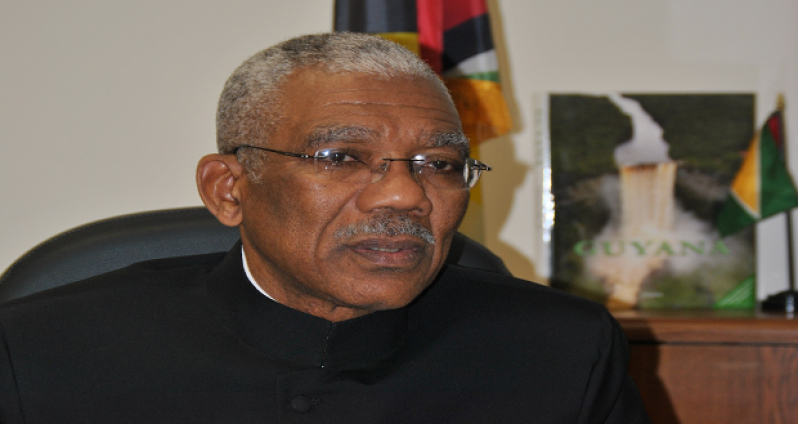STRENGTHENING Guyana’s army reserve is critical and is high on the government’s list of priorities, President David Granger has said.
“In terms of the militia, it will be much stronger; my own preference is to have a stronger reserve and a small, well trained regular force,” he told the Guyana Chronicle in an interview Friday.
What is now called the “reserves” was called the Guyana People’s Militia and was created in 1976. The People’s Militia had an ever- increasing strength from around the 1980s to 1990s.
However, that strength has faltered.
“…it has declined now and I have examined that matter and I have discussed it with the Chief- of -Staff and part of the problem was that it was altered from being a semi-autonomous force under the Defence Act,” said the former Chief –of– Staff of the Guyana Defence Force.
The Defence Act established two forces, the regular force and the reserve force; the reserve force was called the Guyana People’s Militia. However, over time, the name was changed and the reserve component of the force was “subordinated” to the regular force as an infantry battalion.
“So rather than become a separate force, it was given a sort of minority position and for some reason or the other the numbers declined to maybe one tenth of what it was and it is now being built up again,” Granger assured.
Asked about the Defence Force’s push to become modern, President Granger said what government can do is guided by budgetary limitations.
“As far the equipment is concerned, I would say Guyana’s strength now is in the quality of its manpower – the quality of the members of the force – and a lot of emphasis is being placed on training.”
The President believes that more emphasis needs to be placed on the so-called Technical Corps, pointing specifically to the Air Corps, the Coast Guard and the Engineer Corps.
President Granger said that there must be “improvements in aviation and our maritime assets.” But budgetary constraints are likely to prevent that goal from materialising in the short- term.
“We have a budget and we want to ensure that our expenses are kept within certain limits,” said President Granger.
He said the Technical Corps will be part of the Defence Force’s service to the public, admitting that budgetary constraints are a reality but he believes that with time, the force will be at its full strength.
“Yes, within budgetary limits there will be significant improvements in the Defence Force,” the president said, responding to questions on the modernisation and improvement within the arms of the GDF.
With respect to buying “much more equipment,” Granger said “I would say that we are going to develop our Technical Corps, for example, the Engineering Corps will be able to participate in infrastructure projects in the hinterland, which is going to be one of the important functions.” He added that the Air Corps has a tradition of search, rescue and relief, and medical- casualty evacuation.
Similarly, President Granger believes that continuous training is critical to the strength of the force. Asked of his view on bilateral and multilateral military cooperation, Granger said there has been some level of cooperation, most of which has been with Caribbean defence forces, the United States of America (USA), Brazil, and China.
Many persons from defence forces in the Caribbean Region and South America come to Guyana for Training at the Colonel Ulric Pilgrim Officer Cadet School (CUPOCS) at Base Camp Stephenson, Timehri.
“So our cooperation is largely with Caribbean defence forces, and we also have very good relations with Brazil,” the President noted. He added that “There are [foreign]officers that are trained here, in fact there are Brazilian officers in Guyana who assist us with our training and we send officers on courses in other countries.”
Over the years however, Guyana has developed a “very strong training base” the President added, noting that Guyana has not been short of international military cooperation with respect to training. He believes that with cooperation through the Caribbean Basin Security Initiative (CBSI), Guyana has been able to benefit significantly. The United States makes a significant contribution towards the CBSI with more than USD$200M being committed to the funding since 2010. The cooperation includes assistance in the areas of maritime and aerial security cooperation, law- enforcement capacity building, Border/ port security and firearms interdiction, justice sector reform and crime prevention.
On Friday, following the acceptance of letters of credence from the new U.S. Ambassador to Guyana Perry Holloway, President Granger spoke of cooperation under the CBSI. “We have some level of cooperation. Today I received the new letters of credence from the new U.S. Ambassador Mr. Holloway and I made reference to interventions by three U.S. presidents, President Obama, President Clinton and President Bush and the establishment of the Caribbean Basin Security initiative,” he said.
Guyana benefits directly from several of the CBSI programmes, including the provision of patrol boats with the required equipment and training to enable the GDF to combat transnational organised crime, patrol territorial waters, and ensure freedom of movement for commerce.
By Ariana Gordon
Gov’t seeks bigger army reserve – Recapitalisation, increased training on the cards – Engineer Corps to help with hinterland infrastructural development
SHARE THIS ARTICLE :
Facebook
Twitter
WhatsApp




.png)









